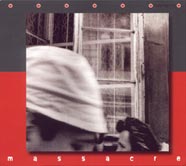
Massacre
Killing Time
(Fred Records/ReR)
Ornette Coleman boarding a plane to New York in 1959 is the symbolic
image of an event that in a short while was destined to change jazz
music forever (maybe for the last time?). Fred Frith boarding a plane
to New York about twenty years later was not an event destined to change
rock music just as deeply (and in those times the field covered by the
word "rock" was already too wide and too fragmented for it
to be changed by just one event); but the purchase of that plane ticket
was destined to be an event of the greatest importance for Frith himself,
since in New York he found musicians and environmental conditions that
made his future quite different from that of his (equally gifted) UK
colleagues who decided to stay at home.
It’s obvious that Fred Frith didn’t get to New York as a brilliant
hopeful, but as a former member of legendary UK groups Henry Cow and
Art Bears. But it was in New York that he met a lot of musicians – just
think about (future) members of Material, Curlew, people like John Zorn
and Wayne Horvitz and so on – who at the time could count on a certain
number of places where one could play, plus (some) sympathetic press,
and a fringe section of the audience who could sustain the musicians’
will to experiment (and so, their survival): a series of conditions
that were absolutely missing in London, where the belief on the part
of the punks and the new wavers in things like "sterile virtuosity"
had taken away the air to breath.
The
trio called Massacre – Frith, bassist Bill Laswell and drummer Fred
Maher – had already been briefly featured on side two of Speechless,
but it was Killing Time (originally released on vinyl by Recommended
Records Japan in 1981) that fully showed their modus operandi and their
results. For many reasons, it’s quite unlikely that the name Massacre
will be known to most young listeners, but I’m confident that listening
to this album will remind them of quite a few rock groups – including
some of the (so-called!) "math" type – from Japan and USA.
Improvisations
and compositions, studio and live recordings, all showed the wide palette
the musicians had at their disposal: Frith could use a melodic or a
"noise" approach with the same brilliance, Laswell showed
nice echoes of funk and Miles, Maher was just as good both in the rhythm
and in the almost-solo mode. The original album’s first track was Legs,
where the melody was played by Laswell’s highly compressed electric
bass; the record offered other very good tracks, such as Killing Time
(where it’s quite easy to hear echoes of groups that came later), Corridor
(The Velvet Underground playing a jig?), Lost Causes (Laswell on Fender
VI), Tourism (where the guitar reminds me quite a bit of Hans Reichel),
After (with its funky angles) and Gate (with nice Afro-Cuban accents
from the percussions).
Compared
to the original album, the present edition offers a few tracks that
had already appeared at the time of the first re-release on CD: in my
opinion, they are all tracks that won’t add a whole lot, but they don’t
make for uneasy listening, either. Two unreleased tracks: Third Street
and a cover of F.B.I. by The Shadows which will make apparent some similarities
in approach that are implicit elsewhere. The CD sounds good. In the
liner notes, we are told that compared to the previous editions (both
vinyl and digital) the tracks from the original LP are at the right
speed and pitch (!), with no reverb added.
Beppe
Colli
©
Beppe Colli 2006
CloudsandClocks.net
| Feb. 3, 2006


